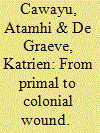| Srl | Item |
| 1 |
ID:
187069


|
|
|
|
|
| Summary/Abstract |
This paper provides a critical analysis of the narratives of Bolivian adoptees in Belgium. We discuss how the adoptees look back upon the imagery of family and culture invoked by their parents and wider social environment and how this imagery has affected their sense of self and belonging. We argue that the adoptees’ narratives testify of a discursive struggle to reclaim control over their lives and histories. While they draw upon prevailing discourses that tend to imagine adoptees as ‘wounded’, they do so in diverse, complex and at times contradictory ways. Their perceptions of the familial and cultural imagery show that while they do not entirely reject the idea of being hurt, they seem to make a shift from explaining this ‘wound’ in individual-psychological terms to explaining it in social terms, making use of emerging anti-racist and decolonial perspectives.
|
|
|
|
|
|
|
|
|
|
|
|
|
|
|
|
| 2 |
ID:
143548


|
|
|
|
|
| Summary/Abstract |
Every year, large numbers of aspiring parents from all over the world come to India to fulfil their dreams of parenthood. They hire an Indian surrogate and with the help of state-of-the-art medical technology, they are able to conceive children they can call their ‘own’. Since 2005, commercial gestational surrogacy in India has become a lucrative industry thanks to the cheap gestational labour, and cheaper medical services. However, this largely unregulated industry is facing roadblocks in international bureaucratic processes. The child born from the arrangement is often caught between conflicting international laws and deemed ‘stateless’. I wish to look at how the state and international laws tend to define persons and relationships by regulating entry and exit, especially through verification and authentication of kin. The world of transparent and visible boundaries – and their policing – is seen through the transnational processes of identifying the stateless children born through the arrangement.
|
|
|
|
|
|
|
|
|
|
|
|
|
|
|
|